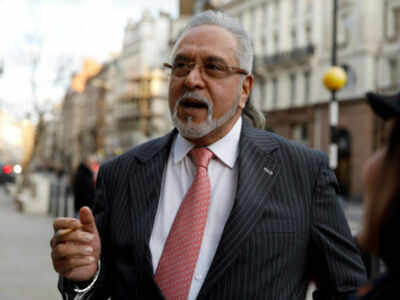[ad_1]

LONDON: Indebted liquor tycoon Vijay Mallya stepped up his fight against bankruptcy in the UK courts on Friday, claiming that the banks’ amended bankruptcy petition against him did not stand up in law as the banks could not forfeit the security they held over his assets in India because it was against the public interest in India to do so as the money he had borrowed was “public money”.
A consortium of Indian banks, led by State Bank of India, is seeking to make the Indian businessman bankrupt in Britain in order to appoint a bankruptcy trustee with wide-ranging powers to investigate his worldwide assets and claw back the Rs 11,000 crore he owes them by virtue of a personal guarantee he gave for loans for Kingfisher Airlines before it went out of business.
The banks were ordered on April 9, 2020 to submit an amended bankruptcy petition agreeing to waive any security they hold over his assets in India in the event a bankruptcy order is made, in order to adhere to UK insolvency laws. The banks are in the process of appealing that order.
But Philip Marshall QC, representing Mallya, told the Insolvency and Companies Court on Friday that under Indian law the banks would not be allowed to give up their security over Mallya’s Indian property, in the event a bankruptcy order is made in the UK, as the money he owes was public money lent by nationalised banks. His argument was that any bankruptcy order made as a result of the amended petition would be thus “made on a false premise”.
He pointed to various judgments in India relating to Mallya, including the DRT and PLMA judgments, which found that the banks held security over Mallya’s assets above other secured creditors including Diageo, as well as above the Enforcement Directorate, owing to the fact they lent public money. “It is not open to the Indian banks to say before this court there is no public interest in them holding security when they have adopted the opposite position in Indian proceedings,” Marshall said.
Marshall added that much of the Rs 11,000 crore was “interest to the principle debt” and Mallya was challenging that interest in the Indian courts. “If we look at that and consider the realisation of his assets to meet the petition debt as well as assets of joint debtors then you don’t end up with an amount sufficient to maintain the bankruptcy petition and so the question of security is very significant,” he said.
He also pointed out that in India there is no recognition of cross-border insolvency. “There is no legislation to enable recognition of an English bankruptcy trustee in India so how can a trustee work effectively to get at the security located in India if it cannot be released?”
Marcia Shekerdemian QC , representing the banks, said: “There is no general rule of public policy in India that prevents a bank from giving up security and that is nowhere in the Indian statutes. How can a bank not deal with its security as it wishes?”
Chief ICC Judge Briggs reserved judgment.
FacebookTwitterLinkedinEMail
[ad_2]
Source link